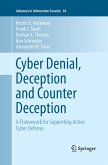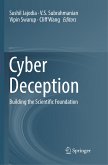This book is an introduction to both offensive and defensive techniques of cyberdeception. Unlike most books on cyberdeception, this book focuses on methods rather than detection. It treats cyberdeception techniques that are current, novel, and practical, and that go well beyond traditional honeypots. It contains features friendly for classroom use: (1) minimal use of programming details and mathematics, (2) modular chapters that can be covered in many orders, (3) exercises with each chapter, and (4) an extensive reference list.Cyberattacks have grown serious enough that understanding and using deception is essential to safe operation in cyberspace. The deception techniques covered are impersonation, delays, fakes, camouflage, false excuses, and social engineering. Special attention is devoted to cyberdeception in industrial control systems and within operating systems. This material is supported by a detailed discussion of how to plan deceptions and calculate their detectability and effectiveness. Some of the chapters provide further technical details of specific deception techniques and their application. Cyberdeception can be conducted ethically and efficiently when necessary by following a few basic principles. This book is intended for advanced undergraduate students and graduate students, as well as computer professionals learning on their own. It will be especially useful for anyone who helps run important and essential computer systems such as critical-infrastructure and military systems.
"The purpose of this book is both to provide a systematic overview of cyberdeception and also to provide a study guide for all readers. ... young researchers, managers, and anyone interested in the problem of cyberdeception will find in this book a great opportunity to learn about the topic. I highly recommend this book for anyone who is looking for an engaging and reader-friendly introduction to cyberdeception." (Eugen Petac, Computing Reviews, April, 2017)








